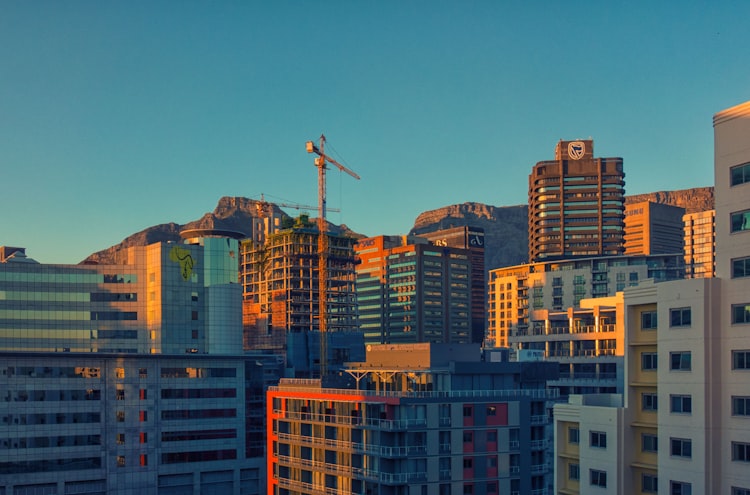Planning for life as a post-covid digital nomad

Hello, grownups!
Shoooooo-weee lots of you have been sending me money questions this week. Trying to get your finances in order for the new year, huh? I applaud your intentions; at least money is one tiny thing we can control in these TIMES OF CHAOS!
I got this question from a reader recently who has been using this pandemic to do some thinking about her future, and asking about how to budget for life as a digital nomad in a post-Covid world.
This past year has really made me think about my priorities. I've realised that one of the things I really want to do with my life is travel more. I'm only in my late 20s, and my husband and I don't have pets or kids yet, and being stuck at home all year has made it feel really important that we go explore the world while we can. We're in the very lucky position where both of us will probably be able to work remotely even once the pandemic is over. Hubby's a freelancer, and my boss has said he'd agree to me working from home as a long-term thing (it's a pretty small company, and I've proven that I can be just as productive when I'm not in the office). Why would I keep working from my boring dining room table in Pretoria when I could rather work from a beach in Bali? Of course, we won't travel until it's safe to do so (probably only next year 😭) but I want to start saving up for it. Our goal is to spend a couple of years travelling and working remotely. How would I even go about budgeting or saving for something like this? Hubby and I are both South Africans, if that helps.
Look, maybe it's just the fact that I've been stuck inside my house for the past 32,390 years, but this does seem like a very delicious post-Covid plan, so I've been thinking about this question a lot. You are very lucky that the digital nomad life is an option for you, and if this is something you want, you should go for it! (In the FUTURE, when it's safe for you, and you're not likely to be a plague carrier, obvs).
Here's the good news: if you are smart about it, travelling the world can actually save you money, or at least, not cost you much more than your normal lifestyle costs at home. You will need to be flexible about where you go, though, and you do need to bulk up your emergency fund.
I've never done the nomad thing long-term myself (it's tricky when you have a cat, unless that cat is Nala) but I have a few friends who have done this for many years, and never intend to stop. I'll be drawing mostly on their wisdom here.
Figuring out a general monthly budget
How much it will cost you to be in another country very much depends on what kind of experience you're after: if your travel fantasies involve champagne, yachts and five star hotels, that's obviously going to require a very different budget to backpacking around India. The good news is that this is the factor that you have the most control over: many nomads choose their destinations based on affordability, and the more you're happy to do this, the easier travel will be for you to afford.
There are really good resources for researching the average cost of temporarily living in different countries. The most well known is probably Nomadlist. Nomadlist is a robust database about popular cities for remote workers, and it's full of useful information ranging from the average cost of living there, to how easy it is to find reliable wifi. It's a great starting point for your research.
John O'Nolan, who is a total mensch and also the founder/CEO of Ghost (the blogging platform this website is built on), has been travelling the world for more than a decade now (Ghost has always been a 100% remote company). He says that a monthly lifestyle budget for a permanent nomad can start at around 1,000 USD a month (around R15k) if you're happy to do it on the cheap, and that you can be extremely comfortable at 2,000 - 3,000 USD a month. His big piece of advice is to only use AirBnb for the first 3-7 days after you arrive in a new place, but to find a longer-term rental by asking around once you're there, because the best value places aren't on the internet (especially in South-East Asia). Find lots of other useful tips about the remote working life from John in this video.
That's in line with my intel from Kristi and Bryce, husband and wife team who blog as Millennial Revolution (you might remember them from the retirement episode of the "Like a Fucking Grownup" podcast). Kristi and Bryce retired in their early 30s. They initially budgeted 60k USD for every year of travelling, but actually found they were able to keep their costs at only 30k USD (around $2,500 a month), and that was splitting their time between expensive and cheap countries. They do a great region-by-region budget breakdown here. They were surprised by how much cheaper travelling was when they could be flexible, and take their time finding special deals. As Kristi puts it:
Turns out traveling isn’t really expensive at all. It was only expensive when we were working because we had to package everything into a hectic 2-week vacation package.
You can work remotely for short periods in many countries on simple 90-day tourist visas, and there are also a bunch of countries that offer special longer-term "digital nomad" visas to South Africans. Here's a list to fuel your daydreams.
Cutting your expenses back home
Now, if you're planning to go travelling for just a year or two, you might not be able to get your expenses back home down to zero. You want to try to get them as low as you can, of course, meaning all the obvious things like giving up or renting out your home etc. But there are some costs you will likely need to continue with:
- Paying to store your stuff. This is surprisingly cheap. You can rent a small self-service storage locker in Cape Town for a few hundred bucks a month.
- Paying to keep your medical aid active. Many medical aids allow you to take a "sabbatical" if you're going to be out of the country for a couple of years. You'll need to keep paying a nominal amount to avoid paying the late joiner penalty when you come back to the country. You should check if your medical aid has a policy like this. Depending on where you're going, you might also need to take out an international medical plan.
- You should keep your income protection policies active, but check that you'll still be covered if you're working overseas (PLEASE make sure you have some kind of income protection policy - they're one of the most important types of insurance there is).
The best way to know what your lifestyle actually costs you right now is to track your spending with an app like 22seven. With any luck, you might be able to find a destination where your cost of living is lower than back home.
Getting smart about taxes
I find tax rules overwhelmingly confusing, and INTERNATIONAL tax rules even confusinger. But Dominik Skalet, senior risk and tax manager at Creative CFO (AKA my tax wizard) pointed out an extremely useful tax policy might make nomad life even more feasible than you might think: the foreign remuneration exemption.
Here's the deal with the foreign remuneration exemption: if you stay and work outside of South Africa for more than 6 months in any 12 month period (there must also be an unbroken 2 months overseas period), you might get to pay your taxes partly at the rate of the other country rather than South Africa.
(This is just a South African thing, as far as I know. Readers from the UK and elsewhere, I have NO IDEA if you have similar policies, soz!)
Obviously, there are a bajillion disclaimers to this. The big ones are:
- This only works if you are employed, so it applies to the letter-writer but not her husband. Your employer also has to be on board with the plan: they're the ones who will have to apply for the exemption on your PAYE taxes (the ones taken off your normal monthly salary).
- It only applies if you earn less than R1,25-million (about 85k USD) during your time overseas.
Here's a concrete example for you: let's say that you are employed and earn R100k a month (that's obviously a very champagne-and-yacht-level salary, but the tax savings are more dramatic the more you earn, so it's more fun to look at).
For the first five months of the (tax) year you stay in South Africa, and pay an effective tax rate of 22%. Then you spend the next seven months in Mauritius, which has an overall effective tax rate of 15%.
Scenario 1: spend 7 months in Mauritius
| Months | Location | Income | Tax paid | Effective tax rate |
|---|---|---|---|---|
| Mar - Jul | SA | R500,000 | R110,000 | 22% |
| Aug - Feb | Mauritius | R700,000 | R105,000 | 15% |
| Total | R1,200,000 | R215,000 | 18% |
You pay R215k tax that year overall.
Now, compare that to what you would have paid if you'd just stayed home:
Scenario 2: just stay in South Africa
| Months | Location | Income | Tax paid | Effective tax rate |
|---|---|---|---|---|
| Mar - Feb | SA | R1,200,000 | R390,000 | 33% |
So, just by being in lovely Mauritius for 7 months, you end up with an extra R175,000 to spend on Dhol Puri and diving lessons.
All of this is 100% legal, by the way. And you're still paying taxes and contributing to roads and schools and other good things; you're just doing that in two different countries rather than one.
Oh, and this is Mauritius:

You could even go somewhere like Dubai, where the income tax rate is 0%, if you like shark-based water parks and giant malls.
Some things to be aware of:
- You'll likely have to register as a taxpayer in other country if you spend any significant amount of time there.
- SARS will ask for supporting documentation (contracts, payslips, passport stamps, etc.) to prove that you actually worked outside of SA.
- Do not stay somewhere else long enough to set up a "permanent home" there, or you risk breaking your tax residence in South Africa, which will mean having to pay exit taxes to SARS and might end up making life very tricky for your employer. There is some murkiness about how long is too long - but to be safe, if you're going to be in one place for longer than 6 months, talk to a tax advisor.
- Freelancer hubby isn't going to save any money on taxes, sorry. He'll be paying the SA tax rate regardless of where he worked from, and will likely have to submit a tax return in both countries.
This stuff is confusing as heck, but TL;DR if you qualify for the foreign remuneration exemption, you should talk to a tax wizard because tax benefits might entitle you to a bigger travel budget than you think. You can book an appointment with Creative CFO here.
Thanks, Dominik, for the hot tip!
The "Oh Shit" fund
There's one last thing you need to budget for, when planning for a life of travel: THE UNPLANNABLE!
A long time ago, in the Before Times (i.e. like a year ago), my partner and I went to a music festival in Barcelona (an experience I rate at five stars out of five). We were cheapskates, so we booked a multi-leg flight to come home that included something like three different stopovers, and I was booked to do a talk the day after I got back home. Missing our first flight would have meant a horrific cascade of other missed flights that would have literally doubled the cost of our whole trip, and risked me not being home in time to do my talk. We left for the airport with plenty of time to spare, but because we cannot read Spanish and are idiots, we ended up getting on the wrong train. Instead of going to the airport, we somehow found ourselves on an express train that was going to a town that was an hour away from Barcelona. Without stopping.
We eventually got out at the other town, frantic, only to discover that there were no express trains BACK to Barcelona, and our choices were either to 1. take a bunch of slow trains back to the airport and definitely miss our flight or to 2. spend a truly eye-watering amount of money on a 1.5-hour Uber back to the airport and maybe miss our flight. Because I have a chunky emergency fund, we were able to take a gamble on the Uber (an experience I rate at one star out of five), and made it onto our flight just as the gates were closing.
Shit goes wrong when you travel. You're in a foreign country, without access to all of the normal social and financial resources you have back home. You need a bigger emergency fund than you think. Whatever you budget for when you work out the monthly cost of living in your new temporary home, add a chunk of cash for those times when things go wrong... because things WILL go wrong.
Dear reader: things are totally nuts right now, and good on you for having used this time to reflect on what you want once things calm down on the world. It's important to have things to look forward to! I'm barely able to make plans beyond the next meal, right now 😂 (I'm going to make tacos, and I am HYPED).
Wishing you daydreams of cocktails on a beach in Mauritius,
Sam
Bonus: two more quick money questions
What is the best or easiest way to buy shares? As a South African can I only buy shares on the JSE?
No, as a South African you buy shares on stock markets all around the world: some of them are just easier to access than others. The easiest international stock market for South Africans to access is the US stock market.
Personally, my favourite way to buy shares is using EasyEquities, because I find it's the easiest platform to use. You can open a US account or a South African account. Note that you can also buy global funds, that diversify your money all around the world, on the JSE. There's a brief discussion about that here, and here is a list of global funds I like to kick off your research.
One thing that has struck me is the importance of fees. Even though you explain it in the book, I am still unsure of how to really understand the fee breakdowns. I have been trying to figure this out on my current retirement annuity (through [Company X]). Is it possible you could help me decode these so I can understand it better? The plan was suggested by my financial advisor (I opened it in 2018) but I would really like some help as I am worried the fees are too high.
Sadly, the fact that you're struggling to find out what the fees are on your retirement annuity (RA) is not an accident. Funny story: when I was in my 20s, I had a financial advisor who just plain dodged this question every single time I asked him (which is why I eventually fired him). You can read that whole saga here.
So, ask your advisor. If you don't get a clear answer, ask Company X directly. They won't be able to give you a full answer, unfortunately, because the advisor is allowed to charge fees on top of company X's fees, so your advisor is the only person who can tell you what you're actually paying. If your advisor is not giving you a clear answer on those fees, that's a strong signal that you should dump them.
If you find out the fees are, in fact, too high, you could consider switching your RA to something cheaper. Do some research into something like the Sygnia Skeleton 70 or 10X (Stealthy Wealthy has a great roundup). Both of them are super simple to open online by yourself.
Updates from Sam-land
- I am a WRITING BEAST at the moment, trying to finish this draft of Magpies by the end of the month (Magpies is the horror mystery novel I'm writing with Dale Halvorsen). It's still looking like an ambitious-but-maybe-just-achievable goal!
- Other recent lovely things: Zadie Smith's essay collection Intimations, the Zombies, Run! Couch to 5K running training app, weekly newsletter about the climate crisis Heated, and the Story Break Podcast where professional Hollywood writers come up with preposterous movie concepts (they're currently live-writing a standalone Jar Jar Binks movie, and it's hilarious).






Member discussion